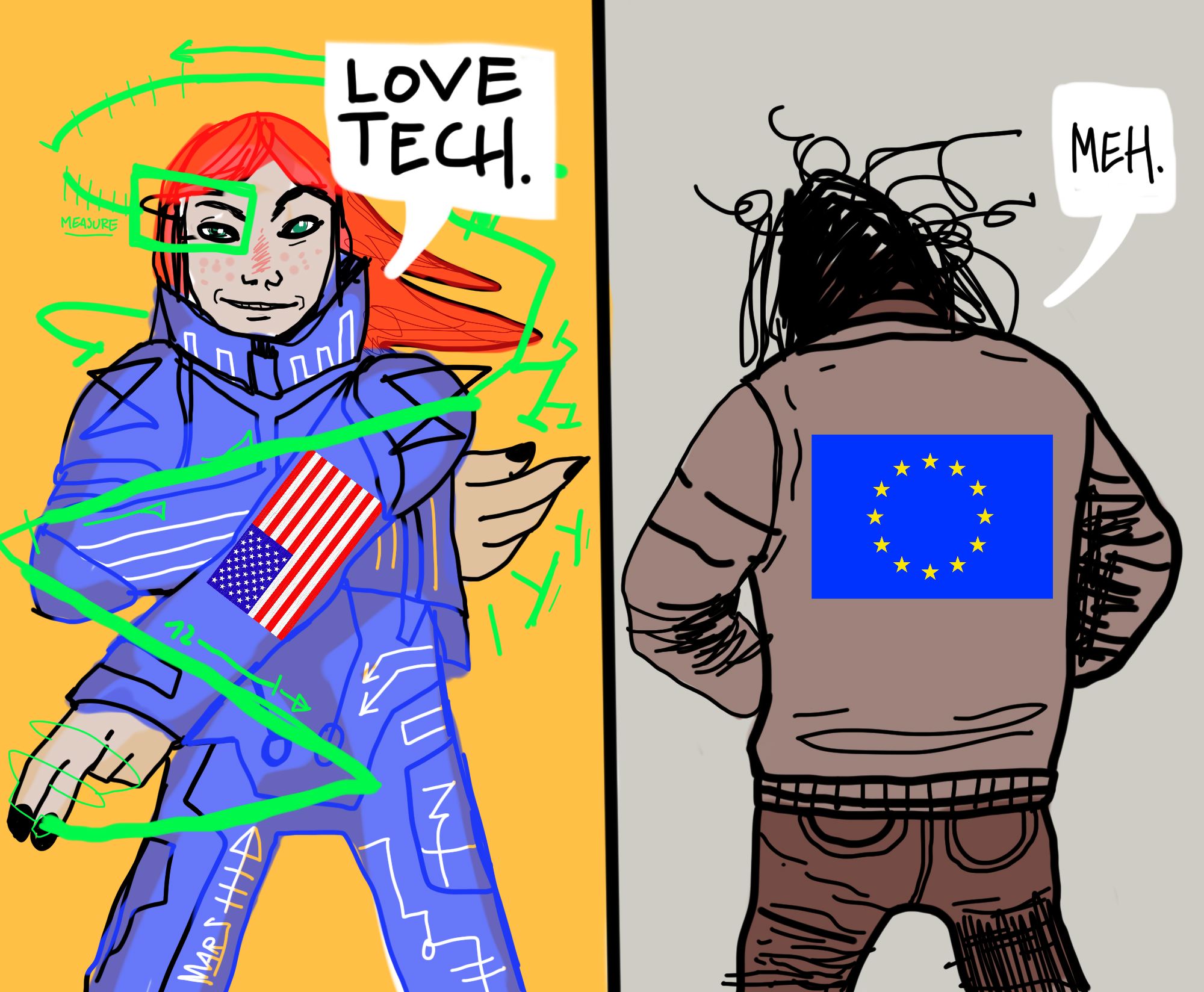By Mars Dorian, {grow} Contributing Columnist
I’ve noticed something strange here in Europe that I couldn’t wrap my head around. At first.
Whether you look at the number of online job postings, the best viral marketing campaigns, or the world’s most respected social media marketing thought leaders, almost all of the innovation seems to come from the US of A.
There are exceptions of course, There always are. But why is it that a modern society like Western Europe — which has similar or better access to technology and creative minds, lacks so much in the social media innovation game ?
So I asked few professionals in the field, and I’ve found a couple of conjectures that may surprise you.
Disclaimer: Of course, I cannot speak for all of Europe, but as a German living in the thriving European start-up city Berlin, and knowing many tech friends from Madrid, London and Paris, I have a pretty good overview of what’s lacking in (Western) Europe, and more important, what YOU can learn from it!
Let’s find out what’s going on here.
1) Europeans are behind because they cling to the past
Gosh, people are obsessed with the past over here. Western Europe is at least 2-3 years behind the US in terms of technological adaptation. And that’s seeing it positively, with glowing rainbow glasses on. Blink blink.
Example: eBook sales in 2012 the US were 22.5% of the overall market, yet only 5% in Europe. From personal experience, that comes with no surprise. When I look around in the subways, I see more people reading deadwood books that eReaders.
But it’s not just eReaders. Smartphones, tablets, heck, any kind of new technological device arrives with years of delay in social acceptance. The minute it’s “old” for Americans, it’s “new” to Europeans.
Lesson: No matter how alluring the past may seem, you can’t cling to it. Content consumption moved from desktop to mobile, who knows where it will move to in the future ? You need to adapt to stay relevant.
2) General disinterest in (new) online networks
The fuel of any social media marketing campaigns are social media platforms.
We need a variety of networks to share our message to make it spread. Americans crave new networks and ideas : yester-yesteryear’s Foursquare becomes yesteryear’s Pinterest becomes this year’s (insert upcoming hit-startup here).
Most of my European friends, even the tech-savvy ones, primarily use Facebook. Seriously.
Twitter? Why would anyone be interested in me taking a crap and tweeting about it?
Google+? Is that a professional Google account?
LinkedIn? Is that some kind of link-building service?
It gets worse. When I visited my mother teaching graphic design at her Uni, and asked her students whether they had a blog or social media presence … no one said “yes.”
But three asked: “What’s a blog?”
Welcome to Europe’s future.
Lesson: in order to spread your content online, you need to try a variety of different online platforms to access your ideal target audience. If it’s just one platform you use (and know about), you’re shooting yourself in the social media foot.
3) Lack of relevant education, lack of thought leaders.
Compared to the US, we have no culture of conferences, other than Loïc Le Meur’s LeWeb event … but even this French guy decided to settle in the U.S.
And with this lack of industry events, this lack of critical networking and conversations, the knowledge doesn’t meld into public mind.
Thought leaders and ruckus makers like Gary Vaynerchuk, Seth Godin and Tim Ferriss change the status quo with their ideas and shine a light on what’s possible now.
Since they’re all American, Europeans seem quick to dismiss their ideas, claiming that what they say will only work in America. Europe lacks role models and mavericks that inspire equally.
Lesson: If you want to level up the innovation in your market and area, you have immerse yourself and become educated. Be it through your blog, network or physical conferences, find a way to bring your knowledge and thought-leading ideas to the public mind.
4) Fractured markets.
Jonah Lehrer wrote in his book “Imagine: How Creativity Works” that innovation happens in densely populated areas — our cities — because creatives bump more into each other and exchange their ideas. That’s why Silicon Valley is America’s hotbed for major online innovation. With so many digital creatives in one tight spot, the constant exchange of new ideas is inevitable. When an idea catches fire across the Valley, it can easily spread around the nation. Whooosh.
Unfortunately, there’s no comparative hotspot in Europe. We have great start-up cities like London, Madrid, Paris, and Berlin, but these are cities that are cultures and countries apart. An app or social media campaign therefore tends to spread only across its culture, especially considering language barriers. French online media doesn’t invade German consciousness, and vice versa.
Lesson: Working remotely from creative hubs is a bad way to innovate. If you want to create more fresh and relevant social media content, you have to be closer to the source.
5) Fear of the future.
It’s no coincidence that in Germany, venture capital is called Risikokapital (“risk capital”).
Throughout Europe, if there’s an unusual idea for a social marketing campaign, people shoot it down first and ask questions later. If it’s unprecedented, it’s viewed as dangerous. Better safe than sorry.
The common mindset seems to be: Let’s see what those crazy Americans are doing, and if it works, maybe we’ll copy it.
M-a-y-b-e.
Hence all the Europe-based copycats of successful American marketing campaigns and online businesses. Obviously, you don’t innovate with that kind of mindset.
You just cope.
Lesson: If you spend your time coping with things, you will never thrive. It’s a requirement to fail with some ideas so you know what works in the future.
Conclusion
The overarching reason Europe is behind has nothing to do with money or resources. It’s more about mindset.
Most of the lack of creativity in the European online space stems from fear — Clinging to past technologies, fear of the future, fear of failing. At least that’s what I found in my interviews and observations.
What do you think?
 Mars Dorian describes himself as a creative marketeer with a moon-melting passion for human potential and technology. You can follow his adventures at www.marsdorian.com/
Mars Dorian describes himself as a creative marketeer with a moon-melting passion for human potential and technology. You can follow his adventures at www.marsdorian.com/
Original illustrations by the author.



